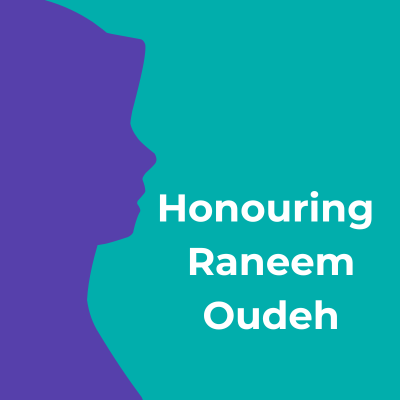During Refugee Week, we celebrate the richness, resilience, and contributions of refugee communities in the UK. It’s also a time to reflect on the inequalities and injustices that continue to impact our communities — especially the women and girls living with domestic abuse, coercive control, and harmful cultural pressures.
This month, we honour the memory of Raneem Oudeh, a 22-year-old Syrian woman who came to the UK seeking safety, freedom, and opportunity. Instead, she was failed by the very systems meant to protect her.
In August 2018, Raneem and her mother, Khaola Saleem, were murdered in Solihull by Raneem’s abusive ex-partner, Janbaz Tarin. In the weeks and days before her death, Raneem had contacted the police multiple times, reporting abuse, stalking, and escalating threats. On the night of the murder, she called 999 — but help came too late.
Raneem’s story is a heartbreaking example of the repeated failings in how stalking and domestic abuse are recognised and responded to. Her death wasn’t inevitable — it was preventable.
In the aftermath of this tragedy, Raneem’s family — especially her aunt, Nour Norris — began campaigning for justice and change. Their efforts led to the introduction of Raneem’s Law, part of the Victims and Prisoners Act 2024.
This new law requires police forces in England and Wales to follow a statutory code of practice for responding to stalking, including:
- Clear guidance on identifying stalking behaviours
- Stronger risk assessments
- A duty to act on victims’ reports more quickly and appropriately
Raneem’s Law is a step forward. It sends a clear message that repeated reports of abuse must be taken seriously and that no woman should be ignored when she reaches out for help.
But her story also highlights the intersectional barriers that migrant women often face: language issues, insecure immigration status, fear of community stigma, and a lack of culturally competent support from mainstream services. Too often, these barriers lead to women staying silent or being disbelieved when they do speak out.
At Staying Put, we see these challenges every day. We work to support women like Raneem; women who are trying to navigate violence, fear, and systems that weren’t designed with their lived realities in mind.
This Refugee Week, we remember Raneem not only for how her life ended, but for the strength and courage she showed in seeking help. Her legacy lives on in the law that now bears her name, and in the ongoing work we must do to protect and empower women facing abuse.
We listen to the voices of survivors, believe in them and act to protect them 💜
If you’re experiencing abuse of any kind, you can speak to us.
Call us on 0808 2800 999
Open Monday – Friday, 9.30am – 4:30pm (closed for half an hour lunch at 1pm)
Our One Front Door helpline is completely free and confidential, and the call will not show up on itemised bills.
If you require help outside of these hours, please call The National Domestic Abuse Helpline on 0808 2000 247.


